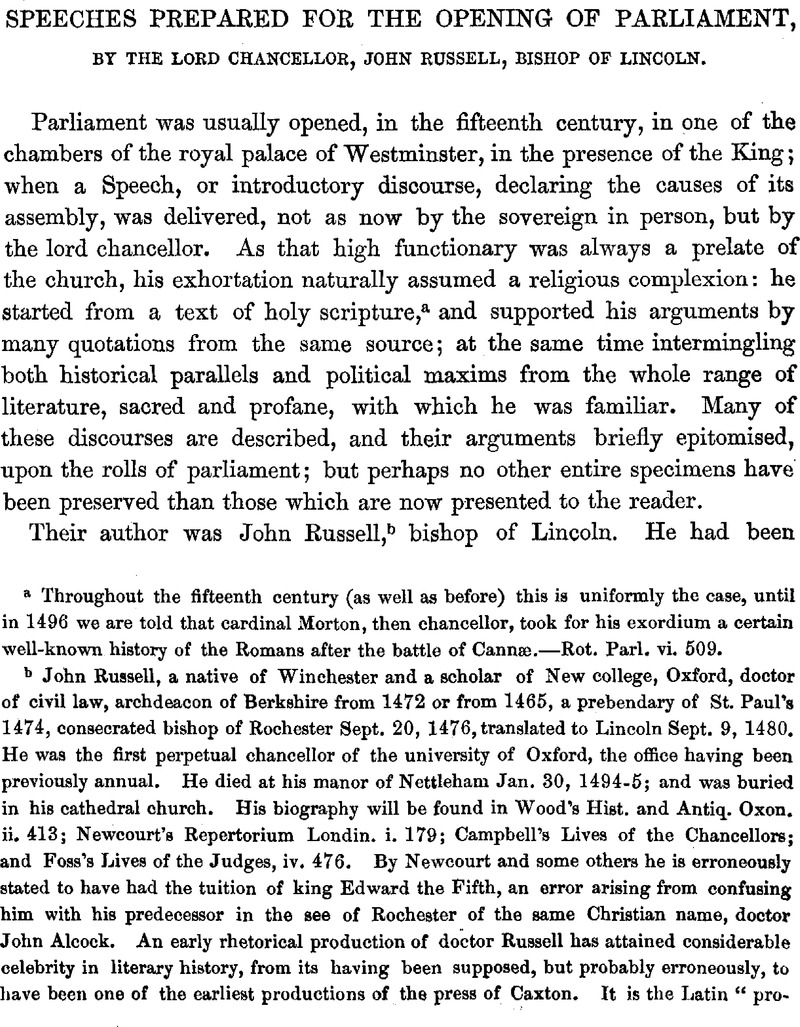No CrossRef data available.
Article contents
Speeches Prepared for the Opening of Parliament, by the Lord Chancellor, John Russell, Bishop of Lincoln
Published online by Cambridge University Press: 25 March 2010
Abstract

- Type
- Other
- Information
- Camden Old Series , Volume 60: Grants, etc. from the Crown during the Reign of Edward the Fifth , December 1854 , pp. xxxv - xxxviii
- Copyright
- Copyright © Royal Historical Society 0000
References
page xxxv note a Throughout the fifteenth century (as well as before) this is uniformly the case, until in 1496 we are told that cardinal Morton, then chancellor, took for his exordium a certain well-known history of the Romans after the battle of Cannae.—Rot. Parl. vi. 509.
page xxxv note b John Russell, a native of Winchester and a scholar of New college, Oxford, doctor of civil law, archdeacon of Berkshire from 1472 or from 1465, a prebendary of St. Paul's 1474, consecrated bishop of Rochester Sept. 20, 1476, translated to Lincoln Sept. 9, 1480. He was the first perpetual chancellor of the university of Oxford, the office having been previously annual. He died at his manor of Nettleham Jan. 30, 1494–5 ; and was buried in his cathedral church. His biography will be found in Wood's Hist, and Antiq. Oxon. ii. 413; Newcourt's Repertorium Londin. i. 179; Campbell's Lives of the Chancellors; and Foss's Lives of the Judges, iv. 476. By Newcourt and some others he is erroneously stated to have had the tuition of king Edward the Fifth, an error arising from confusing him with his predecessor in the see of Rochester of the same Christian name, doctor John Alcock. An early rhetorical production of doctor Russell has attained considerable celebrity in literary history, from its having been supposed, but probably erroneously, to have been one of the earliest productions of the press of Caxton. It is the Latin “propositio” which he addressed to Charles duke of Burgundy in 1470, when he was one of the commissioners sent by Edward IV. to present the order of the garter to that prince. This was printed, probably at Bruges, in the same types which were subsequently used by Caxton in this country; and the only known copy is now in the library at Althorp, having been purchased by Earl Spencer at the sale of the Whiteknights collection in 1819, for the large sum of 120 guineas, though consisting of only 5½ small quarto pages. The oration is reprinted at length in the first volume of Dibdin's edition of Ames's Typographical Antiquities. The autograph letter which king Richard III. addressed to lord chancellor Russell from Lincoln on the 12th Oct. 1483, when he required the great seal during the insurrection of the duke of Buckingham, has been published in fac-simile by the Messrs. Netherclift in their collection of One Hundred Autograph Letters, 1849, 4to. from the original in the Tower of London. In the Cottonian collection, Vesp. E. XII. is a MS. of the Poems of Walter Mape, which is inscribed by Russell's hand, “Le Ruscelluy Je suis. Jo. Lincoln. 1482.” Of this inscription a fae-simile is published in Nichols's Autographs, 1829, plate 3. The same motto, surrounding the bishop's device of a throstle, and also accompanied with roses, both in allusion to his name, still remains on the bosses of the great dining-room and the gateway of Buckden palace (see an engraving in the Gentleman's Magazine for March, 1841). His arms were, Azure, two chevronels between three roses or : as they appear on his monument. The epitaph, in which he is made to offer an epitome of his biography, is as follows :
Qui sum, quse mihi sors fuerat narrabo. Johannes
Russel sum dictus, nomen servans genitoris.
Urbs Ventana parit, studium fuit Oxoniense,
Doctorem Juris me Sarisburia donat
Archidiacono; legatum mittit in orbem
Rex, et privatum mandat deferre sigillum.
Cancellarie regni tune deniqne functus
Officio, cupii dissolvi vivere Christo.
Eeclesias duas suscepi pontificales;
Roffa sacrum primum, Lincolnia condit in unum.
Anno milleno c quater quater atque viceno,
Bis septem junctis vitalia lnmina claudo.
page xxxvii note * It was to have been holden, it appears, on the tenth day after the death of Edward IV. It must have been for a later occasion that the summons in p. 13 was issued.




